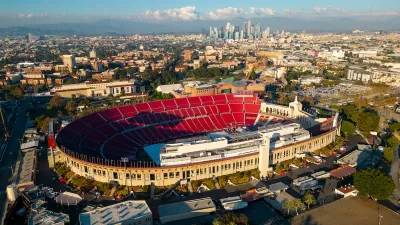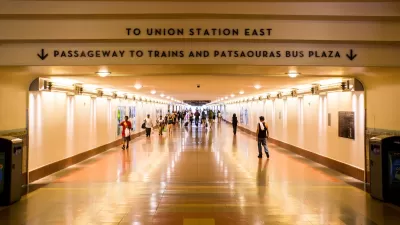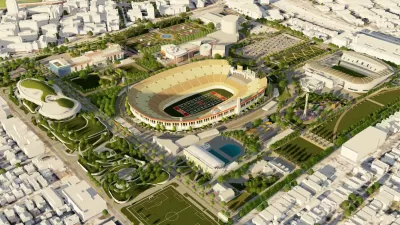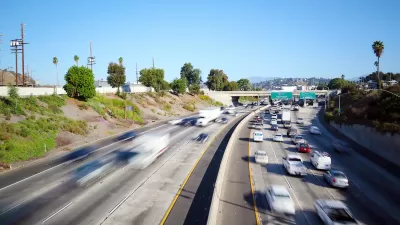Can the city fund its ambitious plans to build over $3 billion of public transit and sustainable transportation projects before the 2028 Olympic Games?

The promise of a “car-free” 2028 Los Angeles Olympics could be slipping away as a $3.3-billion wish list of transportation projects remains almost 95 percent unfunded.
As Rachel Uranga explains in Governing, “Local officials have a litany of projects they want to complete ahead of 2028, from adding charging infrastructure to improving Metro stations close to venues, but so far attempts to secure federal funds have been hit-and-miss.”
With four years to go until the event, only 34 of the 50 Olympic venues have been confirmed. Due to federal security regulations, there will be no parking immediately near most venues.
Unlike in Paris, where the city’s subway system shuttled most Olympics-goers to their destinations, “The workhorse of the L.A. Olympics will likely be buses.” According to Metro, “There will be additional bus shuttles, bus lanes and other key projects and upgrades to make the Games easy on visitors and residents.”
But the short-staffed agency will need to hire more operators and increase service frequency to effectively move the millions of visitors expected for the Games, plus the commuters and residents who regularly rely on transit. A lack of fast and convenient transit to Olympic venues could also lead to a flood of ridesharing vehicles creating more traffic and congestion.
FULL STORY: Does L.A. Have Enough Time, Money to Host a ‘Car Free’ Olympics?

Alabama: Trump Terminates Settlements for Black Communities Harmed By Raw Sewage
Trump deemed the landmark civil rights agreement “illegal DEI and environmental justice policy.”

Study: Maui’s Plan to Convert Vacation Rentals to Long-Term Housing Could Cause Nearly $1 Billion Economic Loss
The plan would reduce visitor accommodation by 25% resulting in 1,900 jobs lost.

Planetizen Federal Action Tracker
A weekly monitor of how Trump’s orders and actions are impacting planners and planning in America.

Waymo Gets Permission to Map SF’s Market Street
If allowed to operate on the traffic-restricted street, Waymo’s autonomous taxis would have a leg up over ride-hailing competitors — and counter the city’s efforts to grow bike and pedestrian on the thoroughfare.

Parklet Symposium Highlights the Success of Shared Spaces
Parklets got a boost during the Covid-19 pandemic, when the concept was translated to outdoor dining programs that offered restaurants a lifeline during the shutdown.

Federal Homelessness Agency Places Entire Staff on Leave
The U.S. Interagency Council on Homelessness is the only federal agency dedicated to preventing and ending homelessness.
Urban Design for Planners 1: Software Tools
This six-course series explores essential urban design concepts using open source software and equips planners with the tools they need to participate fully in the urban design process.
Planning for Universal Design
Learn the tools for implementing Universal Design in planning regulations.
Caltrans
Smith Gee Studio
Institute for Housing and Urban Development Studies (IHS)
City of Grandview
Harvard GSD Executive Education
Toledo-Lucas County Plan Commissions
Salt Lake City
NYU Wagner Graduate School of Public Service





























